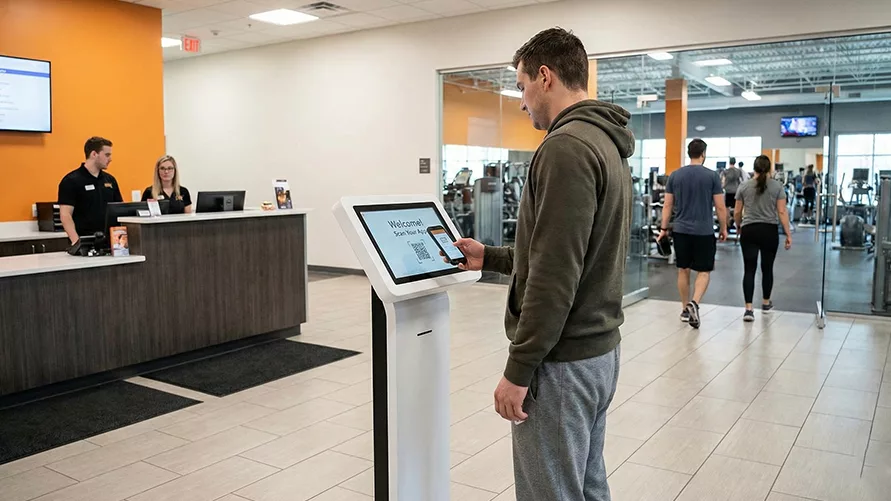A lawsuit can sneak up on you faster than a 5 a.m. spin class. In fact, Vince Gabriele, a famous business coach, says he was hit with a lawsuit in the first four months of opening a gym. That’s one more than anyone wants.
If you are about to open a gym or already have one, this guide is for you. We’ll break down some of the common lawsuits gym owners face and, most importantly, how not to get one served.
So, let’s get started with keeping your business out of court.
As a gym owner, how can you keep the risk of lawsuits low? Let’s break it down.
1. Personal injury claims
People get hurt in gyms, it’s simply inevitable. But when they blame you, they may drag you into court. Slips, equipment malfunctions, or negligent training? That’s a lawsuit waiting to happen.
In one famous case, a 28-year-old woman was training at a gym in New York City. Her trainer slapped a 50-pound weight vest on her while she used a stair climber despite her complaints of pain. The result? She ended up with severe lumbar spine injuries that needed surgery. The court saw this for what it was: negligence, and she walked away with a $2.25 million settlement. Not exactly pocket change.
2. Breach of contract
Contracts are meant to protect you until they don’t. If a member feels misled by hidden fees or can’t escape an unfair cancellation policy, you’re in trouble.
Take the case of a gym that signed a member to a one-year contract in November. Just two months later, she wanted out. The gym refused, slapping her with a hefty 80% penalty on the remaining fees. She took them to court, and the court sided with her, ruling that the penalty was unreasonable under the Consumer Protection Act. The gym lost big, proving that steep penalties can backfire.
3. Discrimination and harassment
Gym owners can’t afford to overlook accessibility or let harassment complaints slide. If you think ADA compliance is optional, think again.
A CrossFit gym in Smyrna, Tennessee, learned this the hard way. They didn’t provide accessible restrooms or doors, and the U.S. Attorney’s office got involved. The result? A $17,000 settlement. ADA compliance isn’t just a “nice-to-have”, it’s a legal requirement that can cost you if ignored.
How not to get sued?
Let’s be honest, lawsuits are preventable if you take the right steps. Here is how to protect yourself from such legal landmines.
Avoiding personal injury claims
Safety comes first, always. Injuries happen, but negligence should not be part of your equation.
- Maintain equipment regularly: Inspect and repair everything on a regular basis. Document each check, you will need proof if someone tries to say you were negligent. Make it someone’s task to check equipment regularly.
- Use safety signage: Slippery floors? Broken machines? Put up a sign. Better yet, fix the problem. But at least give people a heads-up while you are at it.
- Hire certified trainers: Your trainers should always know what they are doing. If someone gets hurt because your staff gave bad advice, you are liable.
Tighten up your contracts and waivers
If done right, your contracts and waivers are your legal defense.
- Clear contracts, no surprises: Be upfront about fees and cancellation policies. Hidden charges will only get you sued. After the pandemic, smart gym owners also added clauses for unforeseen closures, keep that flexibility in mind.
- Ironclad waivers: Have members sign a waiver acknowledging the risks of working out. It won’t protect you from everything, but it can drastically reduce your liability when someone gets hurt.
A bonus tip is to always use robust gym management software with a solid online waiver form option. It helps you keep everything organized and within reach when you need.
Create a safe, inclusive environment
Discrimination and harassment lawsuits are not only costly but can tarnish your gym’s reputation.
- ADA compliance isn’t optional: Make sure your gym is accessible, ramps, wide doors, equipment that works for all bodies. It’s the law, and failing to comply could mean a lawsuit.
- Zero tolerance for harassment: Establish a clear harassment policy. Train your staff to handle complaints. Protect your members, and you will protect yourself.
Insurance is your legal safety net
Even if you follow all the rules, lawsuits can still come knocking. That is where insurance comes in. Some of the common types of insurance you may consider are:
- General liability insurance: Covers accidents and injuries in your gym.
- Professional liability insurance: Protects you when a member claims bad advice from a trainer led to an injury.
- Workers’ compensation: Covers your employees if they get hurt on the job.
Get your legal ducks in a row so you don’t end up learning the hard way.
You don’t want to be the gym owner dealing with lawsuits in your first year. It’s far cheaper to get a lawyer now than fight a lawsuit later.
Never go it alone when it comes to legal matters. Always consult a lawyer to review your contracts, waivers, and insurance policies before you open your gym.
Building a lawsuit-proof gym
Running a gym is not just about memberships and classes. It is also about protecting your business from the legal risks of the territory. Put safety, clarity, and legal preparation first; you’ll drastically reduce your chances of getting sued.
Remember: safety, transparency, and preparation are your best defenses. Get them right, and you’ll be lifting your business to new heights without the weight of a lawsuit dragging you down.





